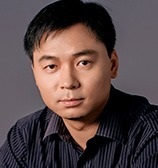AI - Quest for Deep Learning
 Dacheng Tao
Dacheng Tao
University of Sydney
We are fortunate on the edge to embrace the revolutionary progress of Artificial Intelligence (AI) and to witness the enthusiasm of translational AI deployments sweeping across all sectors in our life. The almost simultaneous rise of transformational deep learning, big data, and powerful computational machines since 2010 is progressively enabling AI systems to perceive, learn, reason, and behave like a human, and makes the next generation of AI systems distinct from those developed in the past. Thus, it is critical to better understand the role of deep learning in AI. In this talk, we will present our investigations, initiatives, and insights to the interpretation of the successful deep learning, such as why is deep structure superior to shallow structure, how do skip connections affect model's performance, and what is the relationship between some of the free parameters.
Wednesday, April 22, 2020
Speaker Biography
Dacheng Tao (F'15) is Professor of Computer Science and ARC Laureate Fellow in the School of Computer Science and the Faculty of Engineering, and the Inaugural Director of the UBTECH Sydney Artificial Intelligence Centre, at The University of Sydney. His research results in artificial intelligence have expounded in one monograph and 200+ publications at prestigious journals and prominent conferences, such as IEEE T-PAMI, IJCV, JMLR, AIJ, AAAI, IJCAI, NIPS, ICML, CVPR, ICCV, ECCV, ICDM, and KDD, with several best paper awards. He received the 2018 IEEE ICDM Research Contributions Award and the 2015 Australian Scopus-Eureka prize. He is a Fellow of the IEEE, AAAS, ACM and the Australian Academy of Science.
Safe Autonomy with Deep Learning in Feedback Loop
 George J. Pappas
George J. Pappas
University of Pennsylvania
Deep learning has been extremely successful in computer vision and perception. Inspired by this success in perceiving environments, deep learning is now one of the main sensing modalities in autonomous robots, including driverless cars. The recent success of deep reinforcement learning in chess or AlphaGo suggests that robot planning control will soon be performed by deep learning in a model free manner, disrupting traditional model-based engineering design. However, recent crashes in driverless cars as well as adversarial attacks in deep networks have exposed the brittleness of deep learning perception which then leads to catastrophic decisions. There is a tremendous opportunity for the cyber physical systems community to embrace these challenges and develop principles, architectures, and tools to ensure safety of autonomous systems.
In this talk, I will present our approach in ensuring the robustness and safety of autonomous robots that use deep learning as a perceptual sensor in the feedback loop. Using ideas from robust control, we develop tools to analyze the robustness of deep networks that ensure that the perception of the environment is more accurate. Critical to our approach is creating semantic representations of unknown environments while also quantifying the uncertainty of semantic maps. Autonomous planning and control need to both embrace such semantic representations and formally reason about the environment uncertainty produced by deep learning the feedback loop, leading to autonomous robots that operate with prescribed safely in unknown but learned environments.
Thursday, April 24, 2020
Speaker Biography
George J. Pappas is the UPS Foundation Professor and Chair of the Department of Electrical and Systems Engineering at the University of Pennsylvania. He also holds a secondary appointment in the Departments of Computer and Information Sciences, and Mechanical Engineering and Applied Mechanics. He is member of the GRASP Lab and the PRECISE Center. He has previously served as the Deputy Dean for Research in the School of Engineering and Applied Science. His research focuses on control systems, robotics, formal methods and machine learning for safe and secure cyber-physical systems applications. He has received various awards such as the Antonio Ruberti Young Researcher Prize, the George S. Axelby Award, the O. Hugo Schuck Best Paper Award, the ICCPS Best Paper Award, the NSF PECASE award, and the George H. Heilmeier Faculty Excellence Award. He is a Fellow of IEEE and IFAC and was the inaugural steering committee chair of CPSWEEK. More than thirty alumni of his group are now faculty in leading universities around the world.